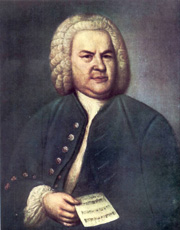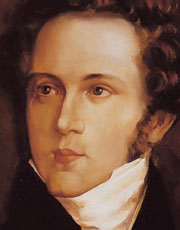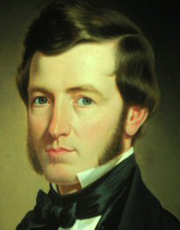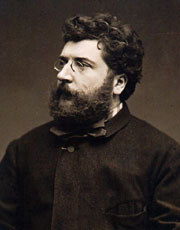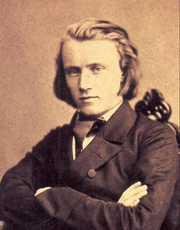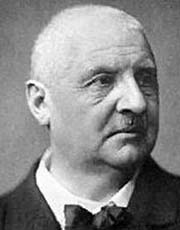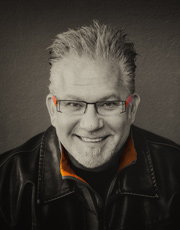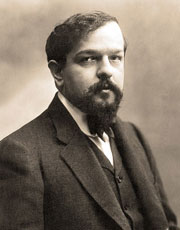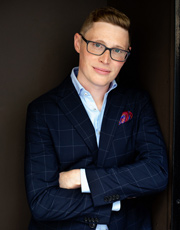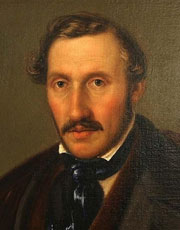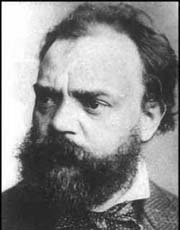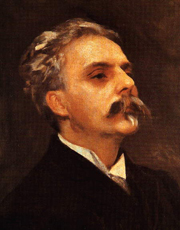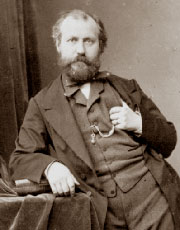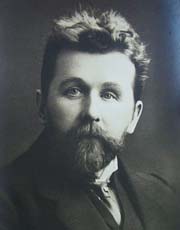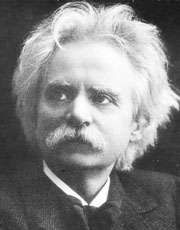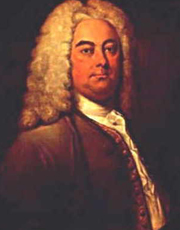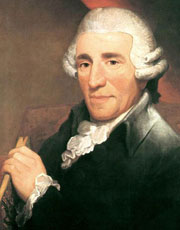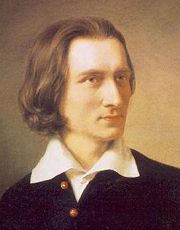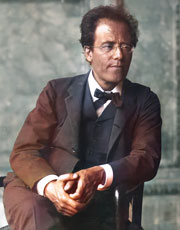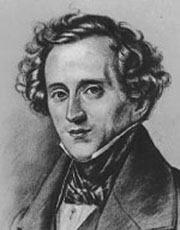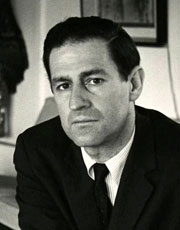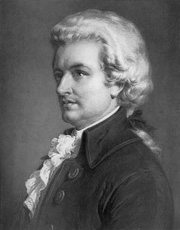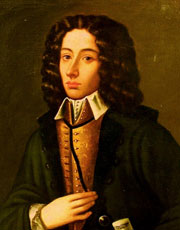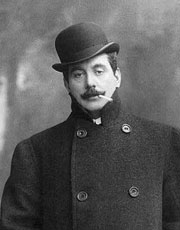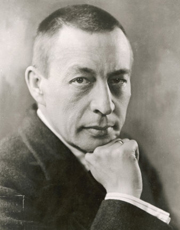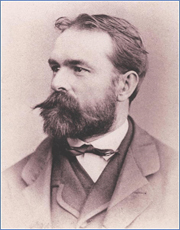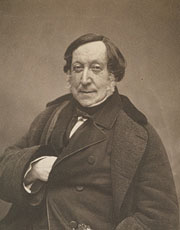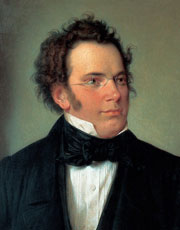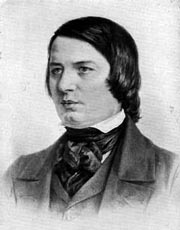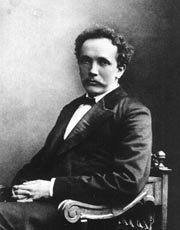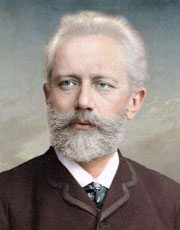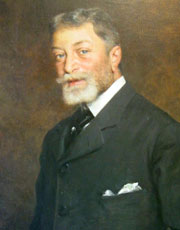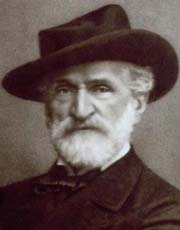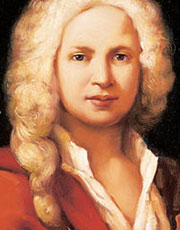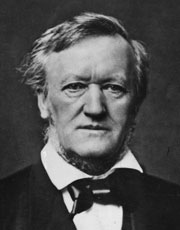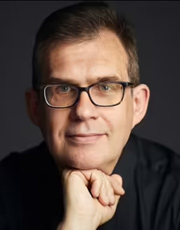In Celebration of the Human Voice - The Essential Musical Instrument
Home | Doo Wop | Barbershop | World | Contemporary | Christian | Vocal Jazz | Choral | Christmas | Instructional | Arrangements
Classical | Opera | Musicals | Personality | Young Singers | Disney | Videos | Songs | The Artists

Classical Choral Composers
The 19th century was the golden age of classical music and, although much was orchestral, there is plenty of great choral composistions as well.
![]() Composers - Early Music | Classical | 20th Century | Modern
Composers - Early Music | Classical | 20th Century | Modern
Displaying 1 - 38 of 38 items.
Johann Sebastian Bach
Born into a musical family, Bach received his earliest instruction from his father. After his father's death in 1695, Bach moved to Ohrdruf, where he lived and studied organ with his older brother Johann Christoph. He also received an education at schools in Eisenach, Ohrdruf, and Luneburg. Bach's first permanent positions were as organist in Arnstadt (1703-1707) and Muhlhausen (1707-1708). During these years, he performed, composed taught, and developed an interest in organ building. From 1708-1717 he was employed by Duke Wilhelm Ernst of Weimar, first as court organist, and after 1714, as concertmaster. During this period, he composed many of his best organ compositions; in his capacity as concertmaster, he was also expected to produce a cantata each month. In Weimar, Bach's style was influenced by his study of numerous Italian compositions (especially Vivaldi concertos).
Vincenzo Bellini
Vincenzo Salvatore Carmelo Francesco Bellini was an Italian opera composer, who was known for his long-flowing melodic lines for which he was named "the Swan of Catania". Many years later, in 1898, Giuseppe Verdi "praised the broad curves of Bellini's melody: there are extremely long melodies as no-one else had ever made before."
A large amount of what is known about Bellini's life and his activities comes from surviving letters - except for a short period - which were written over his lifetime to his friend Francesco Florimo, whom he had met as a fellow student in Naples and with whom he maintained a lifelong friendship. Other sources of information come from correspondence saved by other friends and business acquaintances.
Bellini was the quintessential composer of the Italian bel canto era of the early 19th century
William Billings
William Billings, is considered by many to be the foremost representative of early American choral music. Billings was born in Boston on October 7, 1746. Largely self-trained in music, he was a tanner by trade and a friend of such figures of the American Revolution as Samuel Adams and Paul Revere. Billings's New England Psalm-Singer (1770), engraved by Revere, was the first collection of music entirely by an American.
Billings often wrote the lyrics for his own compositions. Like the notes, the words are occasionally awkward but always forceful and vivid. He wrote long prefaces to his works in which he explained (often in an endearingly eccentric prose style) the rudiments of music and how his work should be performed. His writings reflect his extensive experience as a singing master, and often include advice that would wisely be heeded by choral singers today.
Georges Bizet
Georges Bizet was a French composer of the Romantic era. Best known for his operas in a career cut short by his early death, Bizet achieved few successes before his final work, Carmen, which has become one of the most popular and frequently performed works in the entire opera repertoire.
During a brilliant student career at the Conservatoire de Paris, Bizet won many prizes, including the prestigious Prix de Rome in 1857. He was recognised as an outstanding pianist, though he chose not to capitalise on this skill and rarely performed in public. Returning to Paris after almost three years in Italy, he found that the main Parisian opera theatres preferred the established classical repertoire to the works of newcomers. His keyboard and orchestral compositions were likewise largely ignored; as a result, his career stalled, and he earned his living mainly by arranging and transcribing the music of others. Restless for success, he began many theatrical projects during the 1860s, most of which were abandoned. Neither of his two operas that reached the stage in this time-Les pecheurs de perles and La jolie fille de Perth-were immediately successful.
Johannes Brahms
German pianist and composer Johannes Brahms is ranked among the masters of the Romantic era. Although he showed talent at the piano at an early age, he spent much of his young life performing rather than composing. Brahms's career was given a boost by composer Robert Schumann (1810-56) and his pianist wife Clara (1819-96); his close relationship with Clara, especially after she was widowed, has been the source of much speculation ever since. The pair exchanged passionate letters and went on holiday together, but Brahms opted to leave her behind to pursue his career and a life of bachelorhood. By the end of the 1860s he'd settled in Vienna, where he lived until his death from cancer in 1897. Musically he maintained the Romantic tradition of Ludwig van Beethoven, in opposition to the rise of composers such as Richard Wagner and Brahms's friend, Franz Liszt. His most famous composition is the lullaby, "Lied Wiegenlied" ("Cradle Song"), popularly known as simply "Brahms' Lullaby." His compositions include German Requiem (1866), Violin Concerto in D (1878) and Piano Concertos in B Flat (1878-81).
Anton Bruckner
Anton Bruckner was born in Ansfelden to a schoolmaster and organist father with whom he first studied music. He worked for a few years as a teacher's assistant, fiddling at village dances at night to supplement his income. He studied at the Augustinian monastery in St. Florian, becoming an organist there in 1851. He continued his studies to the age of 40, under Simon Sechter and Otto Kitzler, the latter introducing him to the music of Richard Wagner, which Bruckner studied extensively from 1863 onwards. He had alrady in 1861 made acquaintance with Liszt who was religious like Bruckner and who first and foremost was a harmonic innovator, initiating the new german school together with Wagner. Soon after Bruckner had ended his studies under Sechter and Kitzler, he wrote his first mature work, the Mass in D Minor. He was a very devout Roman Catholic.
Richard Burchard
A college music educator of more than thirty years, Richard Burchard has taught a variety of courses including Composition and Arranging, Music Technology, Music Theory and World Music as well as courses in study abroad programs in Salzburg, Austria and South Africa. A native of Meadville, PA, he attended Edinboro University of Pennsylvania and received both a BM and MM degree from the University of Louisville.
Burchard was named the Kentucky Music Teachers Association 2008 Commissioned Composer and have served as composer-in-residence for a number of organizations, including: The Louisville Vocal Project; Voces Novae, Louisville, KY; St. Martin of Tours Catholic Church, Louisville, KY; The Cathedral of the Assumption, Louisville KY; The American Cathedral in Paris, France; two years with The University of Kentucky Choral Department, Lexington, KY; and four years as Executive Composer-in-Residence at Bellarmine University in Louisville, KY.
Claude Debussy
Claude Debussy was a French composer. He is sometimes seen as the first Impressionist composer, although he vigorously rejected the term. He was among the most influential composers of the late 19th and early 20th centuries.
Born to a family of modest means and little cultural involvement, Debussy showed enough musical talent to be admitted at the age of ten to France's leading music college, the Conservatoire de Paris. He originally studied the piano, but found his vocation in innovative composition, despite the disapproval of the Conservatoire's conservative professors. He took many years to develop his mature style, and was nearly 40 when he achieved international fame in 1902 with the only opera he completed, Pelleas et Melisande.
With early influences including Russian and Far Eastern music, Debussy developed his own style of harmony and orchestral colouring, derided - and unsuccessfully resisted - by much of the musical establishment of the day. His works have strongly influenced a wide range of composers including Bela Bartok, Olivier Messiaen, George Benjamin, and the jazz pianist and composer Bill Evans. Debussy died from cancer at his home in Paris at the age of 55 after a composing career of a little more than 30 years.
Dominick DiOrio
Dominick DiOrio is a conductor and composer who has won widespread acclaim for his contributions to American music. He has been recognized with The American Prizes in both Choral Composition (2014) and Choral Performance (2019, with NOTUS). In July 2020, he became the 14th Artistic Director & Conductor of the Mendelssohn Chorus of Philadelphia, now in its 150th season, where he has had the honor of preparing the singers for performances with The Philadelphia Orchestra.
As a composer, DiOrio has been hailed for a keenly intelligent, evocative style, which shows "a tour de force of inventive thinking and unique colour" (Gramophone). His over 50 published works have appeared at major venues around the world including the Sydney Opera House, Lincoln Center, and Carnegie Hall. He writes music for singers and players of all ages and experiences, and his recent commissioning partners include the San Francisco Gay Men's Chorus, the Children's Chorus of Washington, the Worcester Youth Orchestras, The Choral Arts Society of Washington, and "The President's Own" United States Marine Band.
Gaetano Donizetti
Gaetano Donizetti was among the three great leaders of the opera style known as 'bel canto', the other two being Rossini and Bellini. Donizetti's skills in music were discovered at a very early stage. He was just nine years old when he was enrolled in the Lezioni Caritatevoli School on a full scholarship. As a composer, Donizetti mastered both comic and serious operas and composed 71 operas in his lifetime. His success came with his famous opera, 'Zoraida di Granata', which was noticed by Domenico Barbaia, a famous theatre manager, and Donizetti signed a contract to compose in Naples. He achieved minor popularity in the 1820's, but with his 'Anna Bolena', he gained instant popularity in 1830. This opera was premiered in Milan and he became a famous opera personality throughout Europe. Shortly after, he composed 'Lucia di Lammermoor', which was deemed as his most renowned opera. His works were greatly influenced by Rossini and Bellini and he, like them, staged some of his compositions in Paris, 'Marin Faliero' being one of them. Unfortunately, Paris did not bring him any fame and he turned to Naples. In 1838, he relocated to Paris. He was appointed the music director for the Italian opera at Karntnertortheater and lived in Paris for the rest of his life. Donizetti is remembered for his operas and his style of composition influenced many contemporary and later writers
Antonin Dvorak
Dvorak was born in Nelahozeves near Prague where he spent most of his life. He studied music in Prague's Organ School at the end of the 1850s, and through the 1860s played viola in the Bohemian Provisional Theatre Orchestra which was from 1866 conducted by Bedoich Smetana.
From 1892 to 1895, Dvorak was director of the National Conservatory in New York City. The Conservatory was founded by a wealthy socialite, Jeannette Thurber, who wanted a well-known composer as director in order to lend prestige to her institution. She wrote to Dvorak, asking him to accept the position, and he agreed, providing that she were willing to meet his conditions: that talented Native American and African-American students, who could not afford the tuition, must be admitted for free. She agreed to his conditions, and he sailed to America.
It was during his time as director of the Conservatory that Dvorak formed a friendship with Harry Burleigh, who became an important African-American composer. Dvorak taught Burleigh composition, and in return, Burleigh spent hours on end singing traditional American Spirituals to Dvorak. Burleigh went on to compose settings of these Spirituals which compare favorably with European classical composition.
Gabriel Faure
Born in Pamiers, Ariege, Midi-Pyrenees, he studied at the Niedermeyer school of religious music in Paris with several of the greats including Camille Saint-Saens. He eventually became organist at Eglise de la Madeleine.
He became a prolific composer, and among the most noteworthy of his works are his Requiem, an opera; Penelope, an orchestral suite Masques et Bergamasques (based on music for a dramatic entertainment, or divertissement comique), and music for Pelleas et Melisande. He also wrote chamber music and his two piano quartets are particularly well known. Other chamber music includes two piano quintets, two cello sonatas, two violin sonatas, and a number of piano pieces. He is also known for his songs, such as Clair de lune, Apres un reve, Les roses d'Ispahan, En priere, and several song cycles, including La Bonne Chanson with settings of poems by Verlaine.
Charles Gounod
Charles-Francois Gounod, usually known as Charles Gounod, was a French composer. He wrote twelve operas, of which the most popular has always been Faust (1859); his Romeo et Juliette (1867) also remains in the international repertory. He composed a large amount of church music, many songs, and popular short pieces including his Ave Maria (an elaboration of a Bach piece), and Funeral March of a Marionette.
Few of Gounod's works remain in the regular international repertoire, but his influence on later French composers was considerable. In his music there is a strand of romantic sentiment that is continued in the operas of Jules Massenet and others; there is also a strand of classical restraint and elegance that influenced Gabriel Faure. Claude Debussy wrote that Gounod represented the essential French sensibility of his time.
Alexander Gretchaninov
Gretchaninov started his musical studies rather late because his father, a businessman, had expected the boy to take over the family firm. Gretchaninov himself related that he did not see a piano until he was 14 and began his studies at the Moscow Conservatory in 1881 against his father's wishes and without his knowledge. His main teachers there were Sergei Taneyev and Anton Arensky. In the late 1880s, after a quarrel with Arensky, he moved to St. Petersburg where he studied composition and orchestration with Nikolai Rimsky-Korsakov until 1893. Rimsky-Korsakov immediately recognized Gretchaninov's extraordinary musical imagination and talent and gave him much extra time as well as considerable financial help. This allowed the young man, whose parents were not supporting him, to survive. Out of this came an important friendship, which only ended in 1908 with Rimsky's death. As such, it is not surprising that Rimsky's influence can be heard in Gretchaninov's early works, such as his String Quartet No.1, a prize-winning composition.
Around 1896, Gretchaninov returned to Moscow and was involved with writing for the theater, the opera, and the Russian Orthodox Church. His works, especially those for voice, achieved considerable success within Russia, while his instrumental works enjoyed even wider acclaim. By 1910, he was considered a composer of such distinction that the Tsar awarded him an annual pension.
Edvard Grieg
Grieg was born in Bergen, and was of partial Scottish descent. His great-grandfather immigrated to Norway around 1770, and settled as a businessman in Bergen. Edvard was brought up in a musical home. His mother, Gesine, became his first piano teacher.
In the summer of 1858, Grieg met the legendary Norwegian violinist Ole Bull, who was a friend of the family and Gesine's brother-in-law. Bull noticed the 15-year-old boy's talent and persuaded his parents to allow him to go to Leipzig to study.
Grieg attained numerous concerts in Leipzig, but disliked the dicipline of the conservatory and found it little inspiring. In the spring of 1860, he caught a life-threatening lounge disease. The year after, he made his debut as a concert pianist, in Karlshamn, Sweden. The next year he finished his studies in Leipzig, and held his first concert in his hometown Bergen.
George Frideric Handel
Handel was born February 24, 1685, in Halle, Germany, to a family of no musical distinction. His own musical talent, however, manifested itself so clearly that before his tenth birthday he began to receive, from a local organist, the only formal musical instruction he would ever have. Although his first job, beginning just after his 17th birthday, was as church organist in Halle, Handel's musical predilections lay elsewhere. Thus, in 1703 he traveled to Hamburg, the operatic center of Germany; here, in 1704, he composed his own first opera, Almira, which achieved great success the following year. Once again, however, Handel soon felt the urge to move on, and his inclinations led him to Italy, the birthplace of operatic style. He stopped first at Florence in the autumn of 1706. In the spring and summer of 1707 and 1708 he traveled to Rome, enjoying the patronage of both the nobility and the clergy, and in the late spring of 1707 he made an additional short trip to Naples. In Italy Handel composed operas, oratorios, and many small secular cantatas; he ended his Italian sojourn with the spectacular success of his fifth opera, Agrippina (1709), in Venice.
Franz Joseph Haydn
Franz Joseph Haydnwas an Austrian composer of the Classical period. He was instrumental in the development of chamber music such as the string quartet and piano trio. His contributions to musical form have led him to be called "Father of the Symphony" and "Father of the String Quartet".
Haydn spent much of his career as a court musician for the wealthy Esterhazy family at their Eszterhaza Castle. Until the later part of his life, this isolated him from other composers and trends in music so that he was, as he put it, "forced to become original". Yet his music circulated widely, and for much of his career he was the most celebrated composer in Europe.
He was a friend and mentor of Mozart, a tutor of Beethoven, and the older brother of composer Michael Haydn.
Franz Liszt
Liszt was born in the village of Doborjan, near Sopron, Hungary, in what was then the Austrian Empire (Doborjan is now Raiding in Austria after the Treaty of Trianon of 1920). His baptism record is in Latin and lists his first name as Franciscus. The Hungarian variant Ferenc is often used, though Liszt never used this himself. His father, Adam Liszt, was Hungarian and his mother was Austrian-born Anna Liszt, nee Lagen.
Liszt displayed incredible talent at a young age, easily sight-reading multiple staves at once. His father, who worked at the court of Count Esterhazy, gave him his first music lessons when he was six years old. Local aristocrats noticed his talent and enabled him to travel to Vienna and later to Paris with his family. As a result, Liszt never fully learned Hungarian; his later letters and diaries show that he came to regret this deeply. One letter to his mother begins in faltering Hungarian, and after an apology continues in French (his preferred language).
Gustav Mahler
Gustav Mahler was an Austro-Bohemian Romantic composer, and one of the leading conductors of his generation. As a composer he acted as a bridge between the 19th-century Austro-German tradition and the modernism of the early 20th century. While in his lifetime his status as a conductor was established beyond question, his own music gained wide popularity only after periods of relative neglect, which included a ban on its performance in much of Europe during the Nazi era. After 1945 his compositions were rediscovered by a new generation of listeners; Mahler then became one of the most frequently performed and recorded of all composers, a position he has sustained into the 21st century. In 2016, a BBC Music Magazine survey of 151 conductors ranked three of his symphonies in the top ten symphonies of all time
Felix Mendelssohn
Mendelssohn was the son of a banker, Abraham, who was himself the son of the famous Jewish philosopher, Moses Mendelssohn, and of Lea Salomon, a member od the Itzig family. Abraham sought to renounce the Jewish religion; his children were first brought up without religious education, and were baptised as Lutherans in 1816. (Abraham and his wife were not themselves baptised until 1822). The name Bartholdy was assumed at the suggestion of Lea's brother, Jakob, who had purchased a property of this name and adopted it as his own surname. Abraham was later to explain this decision in a letter to Felix as a means of showing a decisive break with the traditions of his father Moses: 'There can no more be a Christian Mendelssohn than there can be a Jewish Confucius'. Although Felix continued to sign his letters as 'Mendelssohn Bartholdy' in obedience to his fsther's injunctions, he seems not to have objected to the use of 'Mendelssohn' alone.
Gian Carlo Menotti
Gian Carlo Menotti was an Italian-American composer, librettist, director, and playwright who is primarily known for his output of 25 operas. Although he often referred to himself as an American composer, he kept his Italian citizenship. One of the most frequently performed opera composers of the 20th century, his most successful works were written in the 1940s and 1950s. Highly influenced by Giacomo Puccini and Modest Mussorgsky, Menotti further developed the verismo tradition of opera in the post-World War II era. Rejecting atonality and the aesthetic of the Second Viennese School, Menotti's music is characterized by expressive lyricism which carefully sets language to natural rhythms in ways that highlight textual meaning and underscore dramatic intent.
Wolfgang Amadeus Mozart
Probably the greatest genius in Western musical history, Wolfgang Amadeus Mozart was born in Salzburg, Austria, Jan. 27, 1756, the son of Leopold Mozart and his wife, Anna Maria Pertl. Leopold was a successful composer, violinist and assistant concertmaster at the Salzburg court.
Wolfgang began composing minuets at the age of 5 and symphonies at 9. When he was 6, he and his older sister, Maria Anna (who was nicknamed "Nannerl"), performed a series of concerts to Europe's courts and major cities. Both children played the keyboard, but Wolfgang became a violin virtuoso as well.
Giovanni Pergolesi
Giovanni Battista Draghi often referred to as Giovanni Battista Pergolesi, was an Italian Baroque composer, violinist, and organist. His best-known works include his Stabat Mater and the opera La serva padrona (The Maid Turned Mistress). His compositions include operas and sacred music. He died of tuberculosis at the age of 26.
Pergolesi was one of the most important early composers of opera buffa (comic opera). His opera seria, Il prigionier superbo, contained the two-act buffa intermezzo, La serva padrona (The Servant Mistress, 28 August 1733), which became a very popular work in its own right. When it was performed in Paris in 1752, it prompted the so-called Querelle des Bouffons ("quarrel of the comic actors") between supporters of serious French opera by the likes of Jean-Baptiste Lully and Jean-Philippe Rameau and supporters of new Italian comic opera. Pergolesi was held up as a model of the Italian style during this quarrel, which divided Paris's musical community for two years.
Giacomo Puccini
Giacomo Puccini was an Italian composer known primarily for his operas. Regarded as the greatest and most successful proponent of Italian opera after Verdi, he was descended from a long line of composers, stemming from the late-Baroque era. Though his early work was firmly rooted in traditional late-19th-century Romantic Italian opera he later developed his work in the realistic verismo style, of which he became one of the leading exponents.
His most renowned works are La boheme (1896), Tosca (1900), Madama Butterfly (1904), and Turandot (1924), all of which are among the most frequently performed and recorded of all operas.
Most broadly, Puccini wrote in the style of the late-Romantic period of classical music. Music historians also refer to Puccini as a component of the giovane scuola ("young school"), a cohort of composers who came onto the Italian operatic scene as Verdi's career came to an end, such as Mascagni, Leoncavallo, and others mentioned below. Puccini is also frequently referred to as a verismo composer
Sergei Rachmaninoff
Sergei Rachmaninov (also spelled Rachmaninoff) was a legendary Russian composer and pianist who emigrated after the Communist revolution of 1917, and became one of the highest paid concert stars of his time, and one of the most influential pianists of the 20th century.
He was born Sergei Vasilevich Rachmaninov on April 2, 1873, on a large estate near Novgorod, Russia. He was the fourth of six children born to a noble family, and lived in a family estate, where he enjoyed a happy childhood. He studied music with his mother from age 4; continued at the St. Petersburg Conservatory, and then graduated from the Moscow Conservatory in 1892, winning the Great Gold Medal for his new opera "Aleko."
He was highly praised by Pyotr Ilyich Tchaikovsky , who promoted Rachmaninov's opera to the Bolshoi Theater in 1893. But the disastrous premiere of his 1st Symphony, poorly conducted by A. Glazunov, coupled with his distress over the Russian Orthodox Church's pressure against his marriage, caused him to suffer from depression, which interrupted his career for three years until he sought medical help in 1900. He had a three-month treatment by a hypnotherapist, aimed at overcoming his writer's block. Upon his recovery, Rachmaninov composed his brilliant 2nd Piano Concerto, and made a comeback with successful concert performances. From 1904-1906 he was a conductor at the Bolshoi Theater in Moscow.
Max Reger
The celebrated German composer Reger (Johann Baptist Joseph) Max(imilian) Reger, was the son of a school-teacher and amateur musician, who gave him instruction on the piano organ, and various string instruments. In 1874 the family moved to Weiden, where he studied organ and theory with Adalbert Lindner. He then attended the teacher-training college; after visiting the Bayreuth Festival in 1888, he decided on a career in music. He went to Sondershausen to study with Riemann in 1890, and continued as his pupil in Wiesbaden (1890-1893).
From 1890 to 1896, Max Reger was active as a teacher of piano, organ, and theory. Following military service, he returned to Weiden in 1898 and wrote a number of his finest works for organ. He went to Munich in 1901, first gaining general recognition as a pianist and later as a composer; was professor of counterpoint at the Konigliche Akademie der Tonkunst (1905-1906). Prominent compositions from this period included the Piano Quintet, op. 64 (1901-1902), the Violin Sonata, op. 72 (1903), the String Quartet op. 74 (1903-1904), the Variationen und Fuge uber ein Thema von J.S. Bach for Piano, op. 81 (1904), and the Sinfonietta, op. 90 (1904-1905). He went to Leipzig as music director of the University (1907-1908) and as professor of composition at the Conservatory (from 1907).
Josef Rheinberger
The composer, organist and teacher, Josef (Joseph) Gabriel Rheinberger, was unusully gifted as a child and acquired considerable fame when only 5 years old. He recived at about this time lessons in theory, pianoforte and organ from Sebastian Pohly, a retired schoolmaster at Schlanders (a special pedal-board being made for him. When 7 years old, he already served as organist in his parish church, and at the age of 8 composed a mass for three voices. After enjoying for a short time the instruction of Choir-master Schmutzer in Feldkirch, he attended the conservatory at Munich from 1851 to 1854, and finished his musical education with a course under Franz Lachner.
Gioachino Rossini
Gioachino Antonio Rossini was an Italian composer who wrote 39 operas as well as sacred music, chamber music, songs, and some instrumental and piano pieces. His best-known operas include the Italian comedies Il barbiere di Siviglia (The Barber of Seville) and La cenerentola and the French-language epics Moise et Pharaon and Guillaume Tell (William Tell). A tendency for inspired, song-like melodies is evident throughout his scores, which led to the nickname "The Italian Mozart." Until his retirement in 1829, Rossini had been the most popular opera composer in history.
Franz Schubert
Franz Peter Schubert was an Austrian composer of the late Classical and early Romantic eras. Despite his short lifetime, Schubert left behind a vast oeuvre, including more than 600 secular vocal works (mainly lieder), seven complete symphonies, sacred music, operas, incidental music, and a large body of piano and chamber music. His major works include "Erlkonig", the Piano Quintet in A major, the Symphony No. 8 in B minor, the "Great" Symphony No. 9 in C major, the String Quintet, the three last piano sonatas, the opera Fierrabras, the incidental music to the play Rosamunde, and the song cycles Die schone Mullerin and Winterreise.
Robert Schumann
Born in Zwickau, Germany in 1810, Robert Schumann started his musical education on the piano. The son of a bookseller, he began to experiment with composition at an early age, and also cultivated a passion for poetry and literature. Although richly talented, he was never considered a prodigy, especially by the standards of the time. At sixteen, after the tragic deaths of his sister and father, he entered the University of Leipzig to study the law; but this didn't last long, and soon he had left the school to pursue music with all his energies.
At the age of twenty, Schumann was studying the piano with Friedrich Wieck in Leipzig; he also boarded with the Wieck family. Although a hand injury prevented him from pursuing a career as a keyboard virtuoso, he found a niche writing music criticism - and composing, an activity, which was starting to focus his considerable talents. In the early 1830s, he published several piano pieces to critical acclaim. In 1834, he founded the New Journal for Music and served as its editor for the next nine years; the publication attacked what Schumann felt were the shallow and inconsequential musical practices of the day. On the positive side, he recognized the brilliance of Chopin and Brahms.
Richard Strauss
(born June 11, 1864, Munich, Ger. - died Sept. 8, 1949, Garmisch-Partenkirchen) German composer and conductor. Son of a horn player, he began composing at age six. Before he was 20, he had already had major premieres of two symphonies and a violin concerto. In 1885 the conductor of the Meiningen Orchestra, Hans von Bulow, made Strauss his successor. Strongly influenced by the work of Richard Wagner, he began to write programmatic orchestral tone poems, including Don Juan (1889), Till Eulenspiegel's Merry Pranks (1894 - 95), and Also sprach Zarathustra (1896). After 1900 he focused on operas; his third such work, Salome (1903 - 05), was a succes de scandale. Elektra (1906 - 08) marked the beginning of a productive collaboration with the poet Hugo von Hofmannsthal, with whom Strauss wrote his greatest operas, including Der Rosenkavalier (1909 - 10). He remained in Austria through World War II and held a music post in the German government, but he was later cleared of wrongdoing in connection with the Nazi regime. After many years writing lesser works, he produced several remarkable late pieces, including Metamorphosen (1945) and the Four Last Songs (1948).
Gilbert and Sullivan
Gilbert and Sullivan refers to the Victorian-era theatrical partnership of the dramatist W. S. Gilbert (1836-1911) and the composer Arthur Sullivan (1842-1900) and to the works they jointly created. The two men collaborated on fourteen comic operas between 1871 and 1896, of which H.M.S. Pinafore, The Pirates of Penzance and The Mikado are among the best known.
Gilbert, who wrote the libretti for these operas, created fanciful "topsy-turvy" worlds where each absurdity is taken to its logical conclusion-fairies rub elbows with British lords, flirting is a capital offence, gondoliers ascend to the monarchy, and pirates emerge as noblemen who have gone astray. Sullivan, six years Gilbert's junior, composed the music, contributing memorable melodies that could convey both humour and pathos.(
Their operas have enjoyed broad and enduring international success and are still performed frequently throughout the English-speaking world. Gilbert and Sullivan introduced innovations in content and form that directly influenced the development of musical theatre through the 20th century. The operas have also influenced political discourse, literature, film and television and have been widely parodied and pastiched by humorists. The producer Richard D'Oyly Carte brought Gilbert and Sullivan together and nurtured their collaboration. He built the Savoy Theatre in 1881 to present their joint works (which came to be known as the Savoy Operas) and founded the D'Oyly Carte Opera Company, which performed and promoted Gilbert and Sullivan's works for over a century.
Pyotr Ilyich Tchaikovsky
Pyotr Ilyich Tchaikovsky was a Russian composer of the Romantic period. He was the first Russian composer whose music would make a lasting impression internationally. He wrote some of the most popular concert and theatrical music in the current classical repertoire, including the ballets Swan Lake and The Nutcracker, the 1812 Overture, his First Piano Concerto, several symphonies, and the opera Eugene Onegin.
Tchaikovsky's training set him on a path to reconcile what he had learned with the native musical practices to which he had been exposed from childhood. From that reconciliation, he forged a personal but unmistakably Russian style. The principles that governed melody, harmony and other fundamentals of Russian music ran completely counter to those that governed Western European music, which seemed to defeat the potential for using Russian music in large-scale Western composition or for forming a composite style, and it caused personal antipathies that dented Tchaikovsky's self-confidence. Russian culture exhibited a split personality, with its native and adopted elements having drifted apart increasingly since the time of Peter the Great.
Francesco Paolo Tosti
The figure of Francesco Paolo Tosti although very original in the nineteenth-twentieth century scene of Italian musicians, has been revealed through a study promoted by Tosti's National Institute of Ortona such as one of the major European musicians of the time.
Tosti has been an atypical and original musician for his times, in fact he did not write even a line about a lyric opera. He had in his lots of ways of "served" the music: he has been a composer and a renowned singing teacher of his times, he has been a high level musical organiser of the English court under three sovereigns (Queen Victoria, King Eduard VII and King George V). He has been even an expert of editorial marketing and Giulio Ricordi wanted him as a supervisor of the London branch of Casa Ricordi. Almost for thirty years, from 1875 to 1913, he has been all of this in London becoming one of the most important figure of the english music and achieving the title of "Sir" in 1908.
Giuseppe Verdi
Giuseppe Fortunino Francesco Verdi was an Italian Romantic composer, mainly of opera. He was one of the most influential composers of the 19th century. His works are frequently performed in opera houses throughout the world and, transcending the boundaries of the genre, some of his themes have long since taken root in popular culture - such as "La donna e mobile" from Rigoletto, "Va, pensiero" (The Chorus of the Hebrew Slaves) from Nabucco, "Libiamo ne' lieti calici" (The Drinking Song) from La traviata and the "Grand March" from Aida. His work has sometimes been criticized for using a generally diatonic rather than a chromatic musical idiom and for being essentially melodrama during his early years. Verdi's masterworks dominate the standard repertoire a century and a half after their composition.
Antonio Vivaldi
Antonio Lucio Vivaldi was an Italian Baroque composer, virtuoso violinist, teacher, impresario, and Roman Catholic priest. Born in Venice, the capital of the Venetian Republic, Vivaldi is regarded as one of the greatest Baroque composers. His influence during his lifetime was widespread across Europe, giving origin to many imitators and admirers and was paramount in the development of Johann Sebastian Bach's instrumental music and the French concerto (Michel Corrette, Jean-Joseph de Mondonville, Louis-Nicholas Clerambault).
Vivaldi composed many sacred choral works and more than fifty operas. His best-known work is a series of violin concertos known as the Four Seasons. Many of his compositions were written for the all-female music ensemble of the Ospedale della Pietà, a home for abandoned children. Vivaldi had worked as a Catholic priest for 18 months and was employed from 1703 to 1715 and from 1723 to 1740. Vivaldi also had some success with expensive stagings of his operas in Venice, Mantua and Vienna. After meeting the Emperor Charles VI, Vivaldi moved to Vienna, hoping for royal support. However, the Emperor died soon after Vivaldi's arrival, and Vivaldi himself died in poverty less than a year later.
Richard Wagner
Wilhelm Richard Wagner was a German composer, theatre director, polemicist, and conductor who is chiefly known for his operas (or, as some of his mature works were later known, "music dramas"). Unlike most opera composers, Wagner wrote both the libretto and the music for each of his stage works. Initially establishing his reputation as a composer of works in the romantic vein of Carl Maria von Weber and Giacomo Meyerbeer, Wagner revolutionised opera through his concept of the Gesamtkunstwerk ("total work of art"), by which he sought to synthesise the poetic, visual, musical and dramatic arts, with music subsidiary to drama. He described this vision in a series of essays published between 1849 and 1852. Wagner realised these ideas most fully in the first half of the four-opera cycle Der Ring des Nibelungen (The Ring of the Nibelung).
James Whitbourn
James Whitbourn is an internationally-renowned composer recognised by The Observer as "a truly original communicator in modern British choral music". A graduate of Magdalen College, University of Oxford, his career in music began in the BBC, for whom he has worked as composer, conductor, producer and presenter. His compositional output is admired for its direct connection with performers and audiences worldwide and for its ability to "expand the experience of classical music beyond the edges of the traditional map of classical styles" (Tom Manoff, NPR).
Select a Category |
Want to Sing? - Find a Chorus Near You
List of Choruses by State | List of Choruses by City

